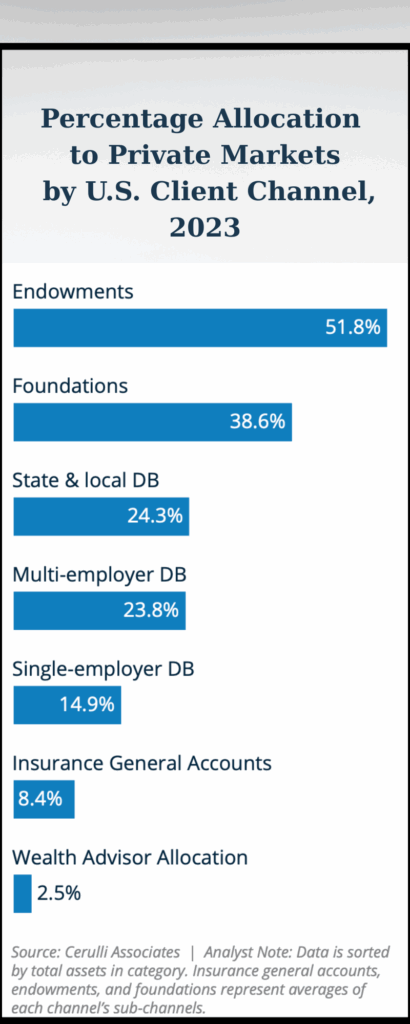If the NAIC succeeds in eradicating the FIO, there will be less oversight of Bermuda Triangle, as RIJ calls it. Federal Reserve economists, the International Monetary Fund, the Bank of International Settlements, and the FIO are among those monitoring the growth strategy.
Articles describing the Bermuda Triangle can be found on the RIJ website. Here’s a quick sketch of it. Giant diversified Wall Street financial firms—hedge funds, private equity funds, private credit originators, or alternative asset managers—began investing in, managing assets for, buying, or creating life insurers for the purpose of selling long-dated fixed deferred annuities.
These firms—Blackstone, KKR, Apollo, etc.—integrate annuity issuers (F&G, Global Atlantic, Athene, etc.) into a synergistic multi-legged financial strategies. In the purest version of the strategy, the asset managers earn fees from managing insurer investments and use some of the annuity revenue to finance their asset-backed securitizations (especially collateralized loan obligations, or CLOs). The insurers’ risk of not earning enough on their investments is transferred to an affiliated or third-party reinsurer in the Caribbean.
This business model, introduced by Apollo/Athene in 2013 (but echoing Executive Life’s strategy in the 1980s), accounts for a big chunk of fixed annuity sales, which account for more than 90% of U.S. life insurer revenues, according to LIMRA. Since most deferred annuities are purchased for their loss-proof yields over fixed terms of one to 15 years, not as insurance against running out of money in extreme old age, life insurance is now primarily an investment (or “protected growth”) business.
NAIC to Brown: ‘Pound sand’
In 2022, then-Sen. Sherrod Brown (D-OH), chair of the Senate Banking Committee, solicited information about the private equity industry’s impact on the U.S. insurance industry.
In a letter to the committee, the Treasury’s Office of Legislative Affairs noted the FIO’s concerns about private equity firms in the life/annuity industry, credited private equity firms with helping re-capitalize that industry after the Great Financial Crisis, and thanked the NAIC for developing new guidelines for life/annuity companies led by asset managers. But the letter also said:
“FIO has been engaging with the NAIC and state regulators to consider the potential impact of the trends described above and how, in light of these evolving market developments, the current regulatory framework may need to be modified so that it continues to enable regulators to safeguard policyholder interests and address potential macroprudential risks.” [Emphasis added.]
The NAIC, in its letter to the Brown committee, said that it has attended to asset managers’ ventures in the life/annuity business since 2013 and concluded, “State insurance regulators are fully capable of assessing and managing the risks of these insurers, and there is nothing PE firms add to the playing field that changes this fact… the state insurance regulatory system has already been working on many of the concerns that you and others have highlighted, and we possess the tools and resources to address these issues.” [Emphasis added.]
Kevin Hennosy, a former public affairs manager at the NAIC and writer of the Rough Notes, a newsletter focused on the U.S. insurance industry, said that the NAIC’s letter to the committee, through “thinly veiled rhetoric… told Senator Brown to, um, pound sand.”
Hennosy added, “One can almost hear the storied corrupt cop on the beat standing in front of a crime scene saying, “Keep moving, Senator, there’s nothing to see here! Remain calm, all is well!”
Insurers and ‘shadow’ finance
Federal Reserve economists have warned of the potential of the Bermuda Triangle strategy to pile risk on the interconnected, dollar-based global financial system. The strategy ties life insurers, in obscure ways, to what economists call “shadow banking” and “shadow insurance.”
“Shadow” refers here to entities that perform a function with exposure to the sunlight of regulation. CLOs, a big business for Bermuda Triangle asset managers, are shadow banks (as are money market funds). They enjoy light regulation by the Securities & Exchange Commission because they serve institutional investors and not less-sophisticated retail investors. Offshore reinsurers sell reinsurance to U.S. annuity issuers under the favorable accounting regimes used in Bermuda or the Cayman Islands.
When the annuity issuer, the asset manager, the reinsurer, the CLO manager, and the CLO borrowers, are members of the same holding company, it’s difficult for any outsider to tell if sister firms are striking less-than-arms-length deals, or if “circular leverage” within a holding company (where the same dollars are cycled through multiple units of a single parent firm) leads to a concentration of risk that could spill over into the larger economy.
© 2025 RIJ Publishing LLC. All rights reserved.


